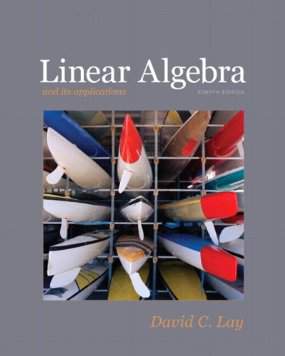Connecting...

This is a quick preview of the lesson. For full access, please Log In or Sign up.
For more information, please see full course syllabus of Linear Algebra
For more information, please see full course syllabus of Linear Algebra
Linear Algebra Eigenvalues and Eigenvectors
Lecture Description
Now we’ll step away vector spaces and look at some very important properties of vectors called eigenvalues and their eigenvectors. Eigenvalues can be thought of as the analogous cousin to the zeroes of a quadratic function; there is a specific way to find the zeroes of a function, and those values tell you a lot about the function. Eigenvalues lead to finding eigenvectors, which are used ad nauseam in advanced linear algebra. Finding eigenvalues is a lot like find RREF in the sense that both methods take some time and patience, but have a clear path to the solution. The same can be said for finding eigenvectors, the path is just a bit longer. Next we’ll look into why these properties are important.
Bookmark & Share
Embed
Share this knowledge with your friends!
Copy & Paste this embed code into your website’s HTML
Please ensure that your website editor is in text mode when you paste the code.(In Wordpress, the mode button is on the top right corner.)
×
Since this lesson is not free, only the preview will appear on your website.
- - Allow users to view the embedded video in full-size.
Next Lecture
Previous Lecture










































 Answer Engine
Answer Engine




2 answers
Last reply by: John Lins
Tue Jan 31, 2017 2:25 PM
Post by John Lins on January 30, 2017
Sorry! I was trying to write the matrix as {{2,1},{0,2}}
Here is the question:
can't solve this question: Let M = {{2,1},{0,2}}. Find all eigenvalues of M. Does M have two independent eigenvector? Can M be diagonalized?
0 answers
Post by John Lins on January 30, 2017
Please, Help!! I can't solve this question: Let M = (2 1).
0 2
Find all eigenvalues of M. Does M have two independent eigenvector?
Can M be diagonalized?
0 answers
Post by John Lins on January 30, 2017
Please, Help!! I can't solve this question:
Let M = (2 1). Find all eigenvalues of M. Does M have two independent eigenvector?
0 2
Can M be diagonalized?
1 answer
Sun Jul 6, 2014 7:31 PM
Post by E D on July 6, 2014
Please help!! :'(
At 32:53, i don't understand why x3 = r, when every value in row3 is zero.
i can see why x1 = -x3 and there fore x1 = -r
and x2 = (-3/2)x3 and there fore x2 = (-3/2)r
but x3 looks like it could be: x3 = -x1
or x3 = (-2/3)x2
1 answer
Tue Jun 3, 2014 7:12 PM
Post by ALI SAAD on June 3, 2014
I have a question, Why do we use (A-rI) at differential equation class but here we use (rI-A)? does it not matter which one comes first?
4 answers
Last reply by: Christian Fischer
Sat Nov 30, 2013 11:16 AM
Post by Christian Fischer on November 24, 2013
Hi Raffi! Great lecture, now i understand it 100%.
Just to make sure: at 21:02 you say that the eigenvector is ((r/2),r)
And then you say the product A*x = (1,1;-1,4)(18,9) is the same as 3*(18,9) but don't you mean 3*(9,18) because i get (1,1;-1,4)(18,9)=(27,72)=3(9,18)
Thank you again and have a great day,
Christian
0 answers
Post by Manfred Berger on June 22, 2013
I may be jumping ahead here but with the zero vector mapping to the zero vector under every linear mapping and 0*any vector being the scalar zero I don't get why you wouldn't exclude both. Can you help me out?
4 answers
Last reply by: Matt C
Sun Apr 28, 2013 11:57 AM
Post by Matt C on April 27, 2013
Hello again. In the book it gives me a 3x3 matrix [[0, -1, 0], [0,0,-1], [a,b,c]]. I wrote the matrix in column form. It then asks me to find a condition on a,b,c such that 1 is an eigenvalue of A. I figured out the question with my first try by just plugging 1 in for each variable (a=1,b=1,c=1). That gives eigenvalues = (1, 1,-1). My question is, is there a method or mathematical way of doing this, instead of just guessing and plugging numbers in? I don't want to see this question on the test and just be plugging in numbers and guessing. Any help or advice would be nice. Thanks.
2 answers
Fri Aug 10, 2012 10:42 PM
Post by Shahaz Shajahan on August 10, 2012
H, just a quick question
Why is the n x n matrix M with its only eigenvalue is 0 is not invertible?
Just came across this question and its asking for a proof, yet i'm stumped! would really appreciate any help.